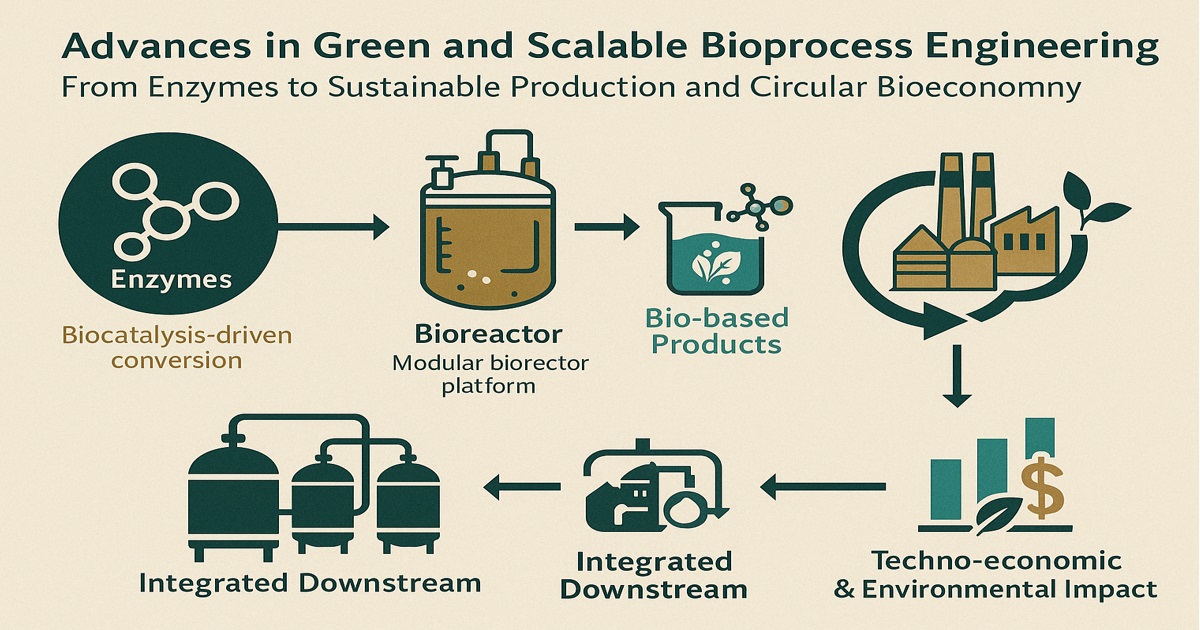- 2.8Impact Factor
- 5.5CiteScore
- 16 daysTime to First Decision
Green and Scalable Bioprocess Engineering: Enzymatic Systems, Process Intensification and Sustainable Applications
This special issue belongs to the section “Biological Processes and Systems“.
Special Issue Information
Dear Colleagues,
The transition towards a bio-based and sustainable economy requires the development of efficient, scalable, and environmentally conscious bioprocesses. As industries seek alternatives to petroleum-based manufacturing, bioprocess engineering is a driving force behind the shift toward green and scalable manufacturing for the production of pharmaceuticals, bio-based chemicals, and value-added compounds.
Recent advances in enzymatic systems, process intensification, and upstream–downstream integration are enabling the development of greener and more robust bioprocesses. These innovations support both industrial and bio-pharmaceutical sectors, offering new pathways for the synthesis of therapeutic proteins, secondary metabolites, and specialty chemicals with reduced environmental impact.
This Special Issue on “Green and Scalable Bioprocess Engineering: Enzymatic Systems, Process Intensification and Sustainable Applications” aims to gather high-quality contributions that address the design, optimization, and scale-up of sustainable bioprocesses. We invite submissions that explore novel strategies in process development, biocatalysis, and bio-based production from a systems and engineering perspective.
Topics include, but are not limited to:
- Enzymatic biocatalysis for pharmaceutical and industrial applications
- Process intensification in fermentation and bioconversion systems
- Integration of upstream and downstream operations in continuous or semi-continuous modes
- Bioprocess scale-up and pilot-to-industrial implementation
- Green chemistry principles in bioprocess design and synthesis routes
- Valorization of renewable resources and biomass in the context of the bioeconomy
- Techno-economic and life-cycle assessments of sustainable bioprocesses
- Design of eco-efficient unit operations and bioreactor systems
- Application of sustainable solvents and low-impact raw materials
This Special Issue emphasizes the process and systems engineering dimension of bioprocess development. Both experimental and computational studies are welcome, particularly those that demonstrate a clear pathway toward greener, scalable, and industrially relevant biotechnological solutions.
We look forward to your contributions.
Dr. Carlos Ocampo-López
Dr. Margarita Ramirez-Carmona
Dr. Leidy Rendón-Castrillón
Guest Editors
Manuscript Submission Information
Manuscripts should be submitted online at www.mdpi.com by registering and logging in to this website. Once you are registered, click here to go to the submission form. Manuscripts can be submitted until the deadline. All submissions that pass pre-check are peer-reviewed. Accepted papers will be published continuously in the journal (as soon as accepted) and will be listed together on the special issue website. Research articles, review articles as well as short communications are invited. For planned papers, a title and short abstract (about 250 words) can be sent to the Editorial Office for assessment.
Submitted manuscripts should not have been published previously, nor be under consideration for publication elsewhere (except conference proceedings papers). All manuscripts are thoroughly refereed through a single-blind peer-review process. A guide for authors and other relevant information for submission of manuscripts is available on the Instructions for Authors page. Processes is an international peer-reviewed open access semimonthly journal published by MDPI.
Please visit the Instructions for Authors page before submitting a manuscript. The Article Processing Charge (APC) for publication in this open access journal is 2400 CHF (Swiss Francs). Submitted papers should be well formatted and use good English. Authors may use MDPI's English editing service prior to publication or during author revisions.
Keywords
- enzymatic bioprocessing
- biopharmaceutical processes
- biocatalysis
- downstream processing
- scale-up
- process intensification
- green chemistry
- bio-based products
- circular bioeconomy
- biomass valorization

Benefits of Publishing in a Special Issue
- Ease of navigation: Grouping papers by topic helps scholars navigate broad scope journals more efficiently.
- Greater discoverability: Special Issues support the reach and impact of scientific research. Articles in Special Issues are more discoverable and cited more frequently.
- Expansion of research network: Special Issues facilitate connections among authors, fostering scientific collaborations.
- External promotion: Articles in Special Issues are often promoted through the journal's social media, increasing their visibility.
- e-Book format: Special Issues with more than 10 articles can be published as dedicated e-books, ensuring wide and rapid dissemination.

